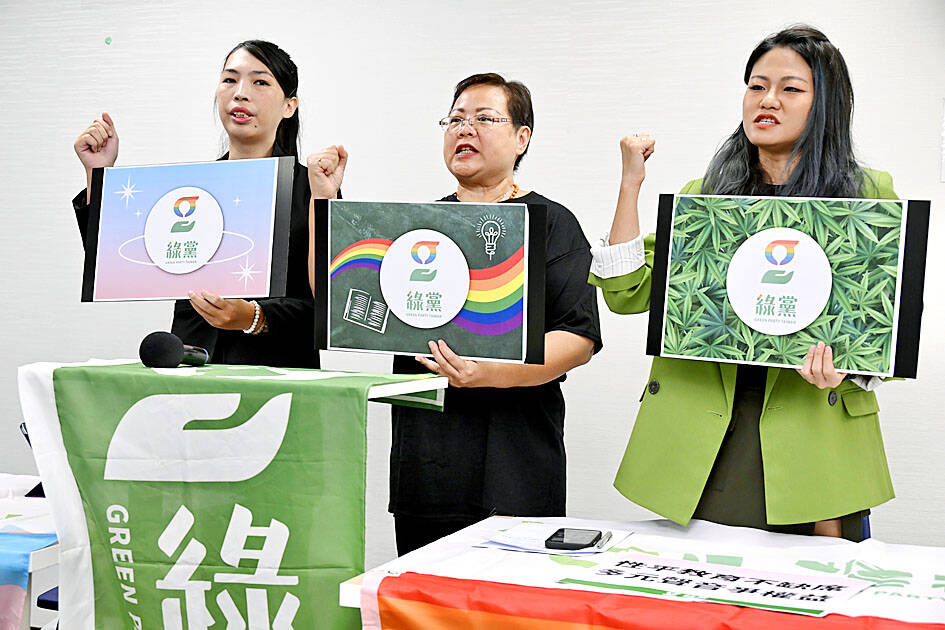The Green Party yesterday announced three women as the party’s legislator-at-large candidates — including the nation’s first transgender candidate — focusing on gender and social issues such as drug decriminalization.
At a news conference in Taipei, the party introduced candidates Zoe Lee (李菁琪), a human rights lawyer known for her cannabis decriminalization advocacy; transgender activist and Taiwan Intersex, Transgender and Transexual People Care Association founder Abbygail Wu (吳伊婷); and Kaohsiung Civil Servant Citizen Watch director Lin Li-fen (林莉棻), a gender-equality advocate who has served on school advisory committees.
“We ask voters to support our party’s main values of social justice and equality, green energy and environmental protection, and also sexual and gender diversity. Please choose the Green Party on the political party ballot in January,” said Lee, who also serves as Green Party convener.

Photo: George Tsorng, Taipei Times
Lee is known as Taiwan’s “weed lawyer,” due to her advocacy work.
“My focus is on decriminalization and legal medical use of cannabis. I am not pushing for indiscriminate use of narcotics or for drug abuse. Conversely, it is because of these problems that we need to decriminalize, instead of harsh prosecution and punishment,” she said.
“We should work to remove society’s prejudice in labeling and vilifying cannabis use as a diabolical, repugnant crime,” she said, adding that the public is only fearful of soft drugs like cannabis because it does not fully understand the issues.
“The mindset should be changed, not to apply severe punishments, but to treat people as ‘addicts’ in more suitable ways,” she said. “If a person is addicted to narcotics and we switch to seeing addiction as an illness, then it would be wrong to throw them into prison. They should receive medical treatment.”
“Since society treats cannabis users as criminals and throws them into prison, how come this has had no effect, that incarceration figures have not declined in all these years?” she asked.
Lee said she advocates legalizing cannabis for medical use so patients could receive more suitable and effective treatment, and to prevent people from accessing cannabis from unknown sources.
She said that even morphine is used for treatment in hospital and clinical trials for pain alleviation, even though is is considered an addictive hard drug and listed as a schedule 1 controlled narcotic.
Wu said she accepted the nomination so the public could learn about LGBTQ+ groups, who are facing many issues and barriers in society and everyday life.
“If I can serve as a legislator, I will draft new statues to ensure equality and protect the rights of transgender people,” she said.
“Our society still has much room for improvement, as trans people like me are facing prejudice and challenges in employment, education, medical treatment and other areas,” said Wu, who with her partner become Taiwan’s first legally married transgender couple.
As Taiwan’s electoral system requires that a party receive at least 5 percent of the vote to be granted legislator-at-large seats, it must gain more electorate support in the political party ballot.
In the 2020 legislative election, the Green Party received 341,465 votes, 2.4 percent of the total vote, unable to pass the 5 percent threshold, although the total made it Taiwan’s seventh-largest party.

Beijing could eventually see a full amphibious invasion of Taiwan as the only "prudent" way to bring about unification, the US Department of Defense said in a newly released annual report to Congress. The Pentagon's "Annual Report to Congress: Military and Security Developments Involving the People's Republic of China 2025," was in many ways similar to last year’s report but reorganized the analysis of the options China has to take over Taiwan. Generally, according to the report, Chinese leaders view the People's Liberation Army's (PLA) capabilities for a Taiwan campaign as improving, but they remain uncertain about its readiness to successfully seize

Taiwan is getting a day off on Christmas for the first time in 25 years. The change comes after opposition parties passed a law earlier this year to add or restore five public holidays, including Constitution Day, which falls on today, Dec. 25. The day marks the 1947 adoption of the constitution of the Republic of China, as the government in Taipei is formally known. Back then the Chinese Nationalist Party (KMT) governed China from Nanjing. When the KMT, now an opposition party in Taiwan, passed the legislation on holidays, it said that they would help “commemorate the history of national development.” That

Taiwan has overtaken South Korea this year in per capita income for the first time in 23 years, IMF data showed. Per capita income is a nation’s GDP divided by the total population, used to compare average wealth levels across countries. Taiwan also beat Japan this year on per capita income, after surpassing it for the first time last year, US magazine Newsweek reported yesterday. Across Asia, Taiwan ranked fourth for per capita income at US$37,827 this year due to sustained economic growth, the report said. In the top three spots were Singapore, Macau and Hong Kong, it said. South

HORROR STORIES: One victim recounted not realizing they had been stabbed and seeing people bleeding, while another recalled breaking down in tears after fleeing A man on Friday died after he tried to fight the knife-wielding suspect who went on a stabbing spree near two of Taipei’s busiest metro stations, Taipei Mayor Chiang Wan-an (蔣萬安) said. The 57-year-old man, identified by his family name, Yu (余), encountered the suspect at Exit M7 of Taipei Main Station and immediately tried to stop him, but was fatally wounded and later died, Chiang said, calling the incident “heartbreaking.” Yu’s family would receive at least NT$5 million (US$158,584) in compensation through the Taipei Rapid Transit Corp’s (TRTC) insurance coverage, he said after convening an emergency security response meeting yesterday morning. National